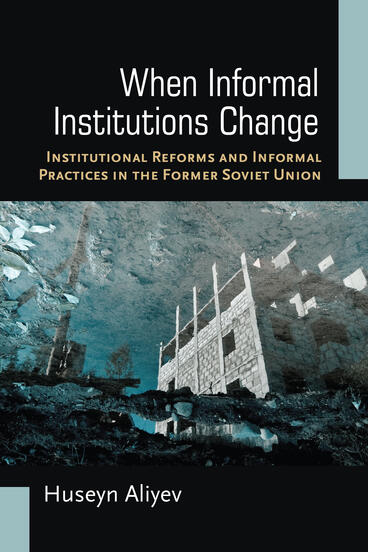When Informal Institutions Change
Institutional Reforms and Informal Practices in the Former Soviet Union
Reveals the impact of institutional change on informal practices in three transitional post-Soviet regimes: Georgia, Moldova, and Ukraine
Description
Huseyn Aliyev examines how, when, and under which conditions democratic institutional reforms affect informal institutions in hybrid regimes, or countries transitioning to democracy. He analyzes the impact of institutional changes on the use of informal practices and what happens when democratic reforms succeed. Does informality disappear, or do elites and populations continue relying on informal structures?
When Informal Institutions Change engages with a growing body of literature on informal practices and institutions in political science, economics, sociology, and beyond. Aliyev proposes expanding the analysis of the impact of institutional reforms on informal institutions beyond disciplinary boundaries, and combines theoretical insights from comparative politics with economic and social theories on informal relations. In addition, Aliyev offers insights that are relevant to democratization, institutionalism, and human geography. Detailed case studies of three transitional post-Soviet regimes—Georgia, Moldova, and Ukraine—illustrate the contentious relationship between democratic institutional reforms and informality in the broader post-Soviet context.
Aliyev shows that in order for institutional reform to succeed in strengthening, democratizing, and formalizing institutions, it is important to approach informal practices and institutions as instrumental for its effectiveness. These findings have implications not only for hybrid regimes, but also for other post-Soviet or post-communist countries.
Huseyn Aliyev is a Post-Doctoral Researcher at the Center for Security Studies (CSS) at Metropolitan University in Prague. More recently, he worked as Lecturer and Post-Doctoral Fellow at the University of Bremen, and a Visiting Fellow at the University of Oxford. From October 2017, Huseyn will work as Lord Kelvin Adam Smith (LKAS) Research Fellow at the University of Glasgow.
Reviews
“An impressive accomplishment. Aliyev engages with numerous literatures from multiple disciplines to provide valuable insights into both the durability and the malleability of informal practices in post-Soviet politics. For theoretical as well as geopolitical reasons, his selection of Georgia, Ukraine and Moldova for detailed comparative case studies could not be more opportune.”
—William Reisinger, University of Iowa
“The book makes an excellent contribution to the literature and provides a timely analysis of the three important countries that it examines. The book will definitely be sought after by scholars working to understand the prospects for reform in the former Soviet Union.”
—Robert Orttung, The George Washington University
"Recommended for college students as well as others interested in political change in the former Soviet Union."
- Choice Reviews Online
--Choice Reviews

